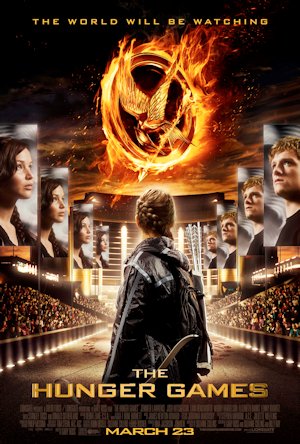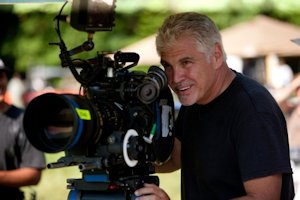Movie Review: The Hunger Games
 | | Indeed it is |
Suzanne Collins' young adult novel, The Hunger Games, is a certified cultural phenomenon. It centers on sixteen year old Katniss Everdeen, a poor girl living in the dystopian society of Panem. A tyrannical government selects two teenage children from each of Panem's twelve districts and forces the kids to fight to the death in a heavily televised contest. When her younger sister is selected, Katniss volunteers to take her place. The story is pretty grim and violent, kind of like The Running Man meets Lord of the Flies, but it also manages to include plenty of fantasy, adventure, and even young romance. Due to its immense popularity, it was only a matter of time before they made a movie, and now that it's here, the obvious questions present themselves. Does it stay true to the novel? Does it shy away from the violent subject matter? Can a movie with a sixteen year old heroine be successful without there being vampires involved?
On the first question, fans of the novel can rest easy knowing that the movie hits all the major plot points and only changes or excludes a few minor ones. The biggest change is during the game itself. In the novel, Katniss spends a great deal of time quiet and alone, and she intuits what's going on through internal exposition. The movie, on the other hand, expands the universe and spends time on events behind the scenes, by elaborating on the character of Seneca Crane, gamemaster of the 74th Hunger Games, and intersplicing commentary by the game's two hosts, Caesar Flickerman and Claudius Templesmith. This makes the narrative comprehensible--and helps foreshadow the sequels--without going overboard with something like narration.
The adaptation is also helped by a stellar cast. Though many of the main characters are young, the actors who play them--most notably the lead, Jennifer Lawrence--are nearly all pleasant surprises. The only exception is Alexander Ludwig, who plays the villainous Cato like a cartoonish 80's movie bully. But Jennifer Lawrence deserves a second mention, because she nails the character of Katniss Everdeen with acting that is far more subtle than one can expect from an actress of her age. Her acting is all in the eyes, and she is able to deliver lots of emotional information without speaking a word, something that is absolutely essential for her pensive-but-strong character.
 | | Lenny Kravitz and Woody Harrelson are much better than I expected |
Not all the actors are virtual unknowns, however. Supporting the young talent are Stanley Tucci, who plays the bombastic Caesar Flickerman, Donald Sutherland, who as president of Panem is the ultimate antagonist, and Woody Harrelson, who does an admirable job underplaying his role as Haymitch, a drunken former Hunger Games champion in charge of training our heroes. There's also Lenny Kravitz, a bit of stunt casting that actually works, in that he is able to play the role of Cinna--Katniss' clothing designer and sole adult confidant--without injecting unnecessary sexual overtones to their brief but meaningful relationship.
Director Gary Ross, known primarily as a writer but with Pleasantville and Seabiscuit under his directorial belt, could have stopped there and made a straight-forward blockbuster that would please fans and rake in the box office dollars. Instead, he was willing to take a few stylistic gambles, opting for a slightly more artistic take on the material. The film is chock full of manic editing and experimental touches--most memorably during the tracker jacker hallucination sequence--but it is careful to never get completely carried away with them, knowing just how far to take a close-up hand-held shot before pulling back and allowing the audience to take a breath, for example.
 | | Gary Ross proves his directing chops |
He also plays with sound to great effect. An early example is when Katniss is brought out to be interviewed in front of an enormous crowd in preparation for the game. As soon as she faces the audience, the sound is muffled into non-existence, a trick used most famously by Steven Spielberg in Saving Private Ryan. It may not be as intense as an attack on Normandy, but it is nonetheless effective to show us what's going on in Katniss' head.
The music is also, at times, experimental. There are normal, classical themes, interspersed with haunting, off-key voices and synthetic warbles. It's characteristic of the film itself, moments of playful toying with expectations separated by more comfortable, straight-forward filmmaking. The result is a movie that keeps the audience ever-so-slightly off-balance and uncomfortable, but it never is outright hostile the way an art film can be. (I can imagine The Hunger Games being an art film that puts up a mirror and accuses the audience of taking delight in the suffering of the characters, much like Funny Games--thank goodness that is not the movie Gary Ross made.) Given the subject matter, this is wholly appropriate.
 | | Minor spoiler alert: the heroine kills some of her peers |
This is a dark film, and I would recommend parents see it before taking their kids. It's a tale told like a good adventure yarn, but when the violence starts, it doesn't let up. Once the game begins, you will see children killing children. While the camera never focuses on gore or sensational mayhem, it doesn't exactly shy away from blood or injury either. It's nothing worse than the kind of stuff I grew up with (and it's really nothing compared to Lord of the Flies, a book I had to read in middle school), but it's not for the squeamish.
Luckily, it never fully embraces its darker themes at the expense of its lighter fantasy fare. Costumes, make-up, and hairstyles are wildly imaginative--surprisingly true to the book--and the settings outside of the game and the outlying districts are completely unreal digital creations. The visual effects are, on the whole, pretty good, but there are a few moments where they fall apart, the most egregious being the scene where Katniss and Peeta make their fiery entrance, a scene that deserves to be more impressive than it is.
This movie is going to make a lot of money, and it deserves to. Its messages are poignant without getting preachy; its subject matter is intelligent without being unintelligible; it's experimental without being unwatchable; it's dark without being depressing or amoral; in short, it's the best kind of Hollywood blockbuster. I'm anxious to see it again, and I'm happy to know that the story will continue.
FINAL SCORE:





The Hunger Games succeeds in being far more than just a straight-forward adaptation of young adult pulp fiction, and thus it earns its popularity.
|
-e. magill 3/27/2012
|
|